Dario Fo
Nobel Prize lecture
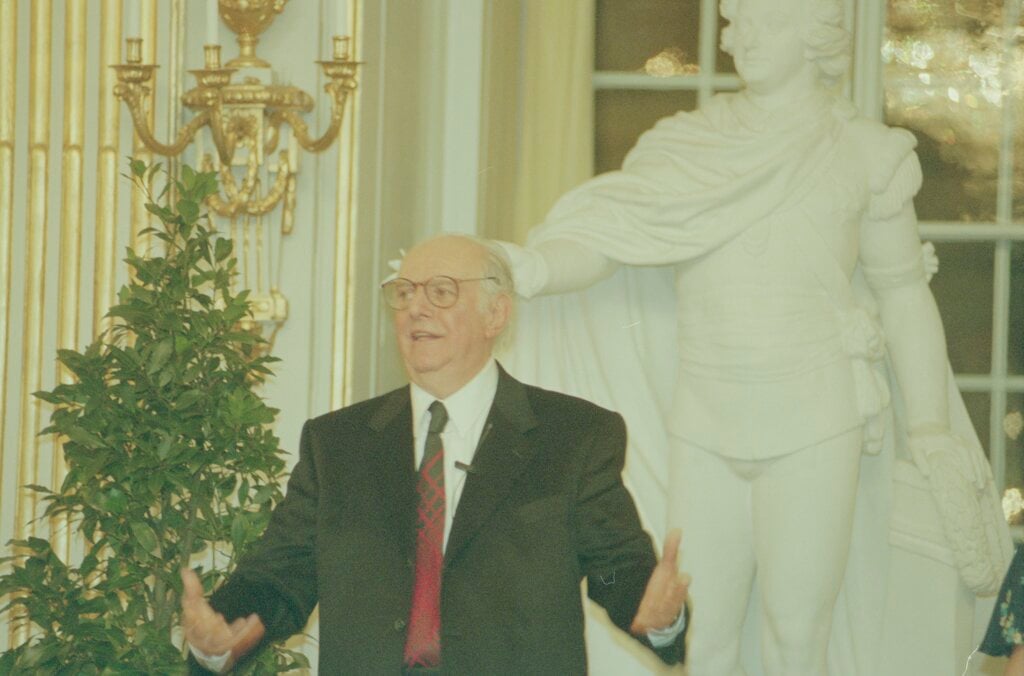
English
Italian
Swedish
Nobel Lecture, December 7, 1997
Contra Jogulatores Obloquentes
Against Jesters Who Defame and Insult
“Against jesters who defame and insult”. Law issued by Emperor Frederick II (Messina 1221), declaring that anyone may commit violence against jesters without incurring
The drawings I’m showing you are mine. Copies of these, slightly reduced in size, have been distributed among you.
For some time it’s been my habit to use images when preparing a speech: rather than write it down, I illustrate it. This allows me to improvise, to exercise my imagination – and to oblige you to use yours.
As I proceed, I will from time to time indicate to you where we are in the manuscript. That way you won’t lose the thread. This will be of help especially to those of you who don’t understand either Italian or Swedish. English-speakers will have a tremendous advantage over the rest because they will imagine things I’ve neither said nor thought. There is of course the problem of the two laughters: those who understand Italian will laugh immediately, those who don’t will have to wait for Anna [Barsotti]’s Swedish translation. And then there are those of you who won’t know whether to laugh the first time or the second. Anyway, let’s get started.
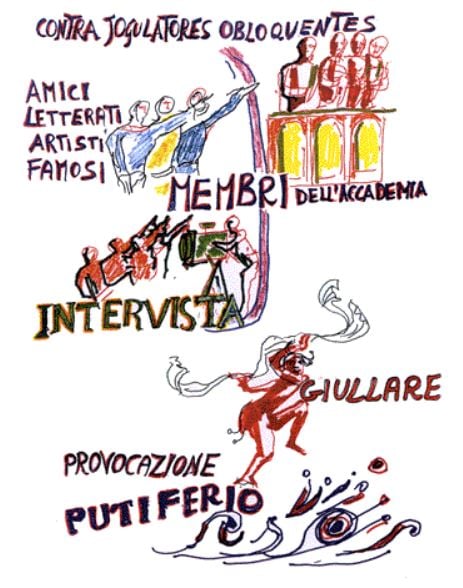
Ladies and gentlemen, the title I’ve selected for this little chat is “contra jogulatores obloquentes”, which you all recognize as Latin, mediaeval Latin to be precise. It’s the title of a law issued in Sicily in 1221 by Emperor Frederick II of Swabia, an emperor “anointed by God”, who we were taught in school to regard a sovereign of extraordinary enlightenment, a liberal. “Jogulatores obloquentes” means “jesters who defame and insult”. The law in question allowed any and all citizens to insult jesters, to beat them and even – if they were in that mood – to kill them, without running any risk of being brought to trial and condemned. I hasten to assure you that this law no longer is in vigour, so I can safely continue.
Ladies and gentlemen,
Friends of mine, noted men of letters, have in various radio and television interviews declared: “The highest prize should no doubt be awarded to the members of the Swedish Academy, for having had the courage this year to award the Nobel Prize to a jester.” I agree. Yours is an act of courage that borders on provocation.
It’s enough to take stock of the uproar it has caused: sublime poets and writers who normally occupy the loftiest of spheres, and who rarely take interest in those who live and toil on humbler planes, are suddenly bowled over by some kind of whirlwind.
Like I said, I applaud and concur with my friends.
These poets had already ascended to the Parnassian heights when you, through your insolence, sent them toppling to earth, where they fell face and belly down in the mire of normality.
Insults and abuse are hurled at the Swedish Academy, at its members and their relatives back to the seventh generation. The wildest of them clamour: “Down with the King … of Norway!”. It appears they got the dynasty wrong in the confusion.
(At this point you may turn the page. As you see there is an image of a naked poet bowled over by a whirlwind.)
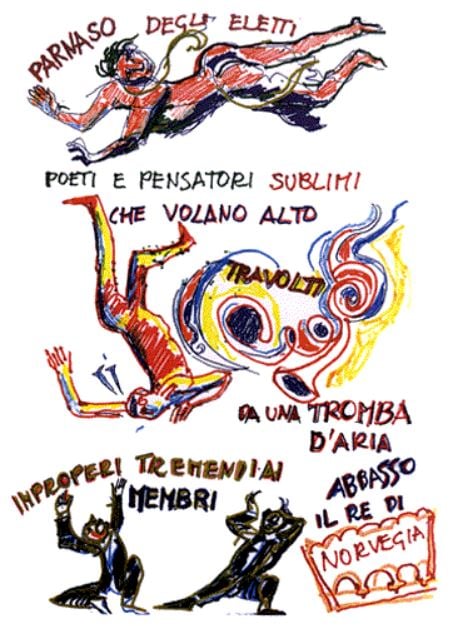
Some landed pretty hard on their nether parts. There were reports of poets and writers whose nerves and livers suffered terribly. For a few days thereafter there was not a pharmacy in Italy that could muster up a single tranquillizer.
But, dear members of the Academy, let’s admit it, this time you’ve overdone it. I mean come on, first you give the prize to a black man, then to a Jewish writer. Now you give it to a clown. What gives? As they say in Naples: pazziàmme? Have we lost our senses?
Also the higher clergy have suffered their moments of madness. Sundry potentates – great electors of the Pope, bishops, cardinals and prelates of Opus Dei – have all gone through the ceiling, to the point that they’ve even petitioned for the reinstatement of the law that allowed jesters to be burned at the stake. Over a slow fire.
On the other hand I can tell you there is an extraordinary number of people who rejoice with me over your choice. And so I bring you the most festive thanks, in the name of a multitude of mummers, jesters, clowns, tumblers and storytellers.
(This is where we are now [indicates a page].)
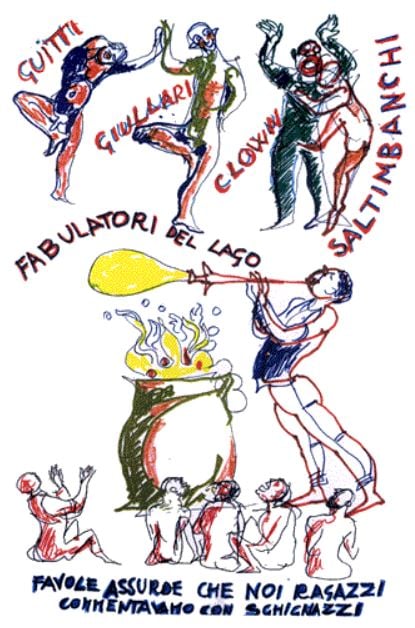
And speaking of storytellers, I mustn’t forget those of the small town on Lago Maggiore where I was born and raised, a town with a rich oral tradition.
They were the old storytellers, the master glass-blowers who taught me and other children the craftsmanship, the art, of spinning fantastic yarns. We would listen to them, bursting with laughter – laughter that would stick in our throats as the tragic allusion that surmounted each sarcasm would dawn on us. To this day I keep fresh in my mind the story of the Rock of Caldé.
“Many years ago”, began the old glass-blower, “way up on the crest of that steep cliff that rises from the lake there was a town called Caldé. As it happened, this town was sitting on a loose splinter of rock that slowly, day by day, was sliding down towards the precipice. It was a splendid little town, with a campanile, a fortified tower at the very peak and a cluster of houses, one after the other. It’s a town that once was and that now is gone. It disappeared in the 15th century.
“‘Hey’, shouted the peasants and fishermen down in the valley below. ‘You’re sliding, you’ll fall down from there’.
“But the cliff dwellers wouldn’t listen to them, they even laughed and made fun of them: ‘You think you’re pretty smart, trying to scare us into running away from our houses and our land so you can grab them instead. But we’re not that stupid.’
“So they continued to prune their vines, sow their fields, marry and make love. They went to mass. They felt the rock slide under their houses but they didn’t think much about it. ‘Just the rock settling. Quite normal’, they said, reassuring each other.
“The great splinter of rock was about to sink into the lake. ‘Watch out, you’ve got water up to your ankles’, shouted the people along the shore. ‘Nonsense, that’s just drainage water from the fountains, it’s just a bit humid’, said the people of the town, and so, slowly but surely, the whole town was swallowed by the lake.
“Gurgle … gurgle … splash … they sink …. houses, men, women, two horses, three donkeys … heehaw … gurgle. Undaunted, the priest continued to receive the confession of a nun: ‘Te absolvi … animus … santi … guurgle … Aame … gurgle …’ The tower disappeared, the campanile sank with bells and all: Dong … ding … dop … plock …
“Even today”, continued the old glass-blower, “if you look down into the water from that outcrop that still juts out from the lake, and if in that same moment a thunderstorm breaks out, and the lightning illuminates the bottom of the lake, you can still see – incredible as it may seem! – the submerged town, with its streets still intact and even the inhabitants themselves, walking around and glibly repeating to themselves: ‘Nothing has happened’. The fish swim back and forth before their eyes, even into their ears. But they just brush them off: ‘Nothing to worry about. It’s just some kind of fish that’s learned to swim in the air’.
“‘Atchoo!’ ‘God bless you!’ ‘Thank you … it’s a bit humid today … more than yesterday … but everything’s fine’. They’ve reached rock bottom, but as far as they’re concerned, nothing has happened at all.”
Disturbing though it may be, there’s no denying that a tale like this still has something to tell us.
I repeat, I owe much to these master glass-blowers of mine, and they – I assure you – are immensely grateful to you, members of this Academy, for rewarding one of their disciples.
And they express their gratitude with explosive exuberance. In my home town, people swear that on the night the news arrived that one of their own storytellers was to be awarded the Nobel Prize, a kiln that had been standing cold for some fifty years suddenly erupted in a broadside of flames, spraying high into the air – like a fireworks finale – a myriad splinters of coloured glass, which then showered down on the surface of the lake, releasing an impressive cloud of steam.
(While you applaud, I’ll have a drink of water. [Turning to the interpreter:] Would you like some?
It’s important that you talk among yourselves while we drink, because if you try to hear the gurgle gurgle gurgle the water makes as we swallow we’ll choke on it and start coughing. So instead you can exchange niceties like “Oh, what a lovely evening it is, isn’t it?”.
End of intermission: we turn to a new page, but don’t worry, it’ll go faster from here.)
Above all others, this evening you’re due the loud and solemn thanks of an extraordinary master of the stage, little-known not only to you and to people in France, Norway, Finland … but also to the people of Italy. Yet he was, until Shakespeare, doubtless the greatest playwright of renaissance Europe. I’m referring to Ruzzante Beolco, my greatest master along with Molière: both actors-playwrights, both mocked by the leading men of letters of their times. Above all, they were despised for bringing onto the stage the everyday life, joys and desperation of the common people; the hypocrisy and the arrogance of the high and mighty; and the incessant injustice. And their major, unforgivable fault was this: in telling these things, they made people laugh. Laughter does not please the mighty.
Ruzzante, the true father of the Commedia dell’Arte, also constructed a language of his own, a language of and for the theatre, based on a variety of tongues: the dialects of the Po Valley, expressions in Latin, Spanish, even German, all mixed with onomatopoeic sounds of his own invention. It is from him, from Beolco Ruzzante, that I’ve learned to free myself from conventional literary writing and to express myself with words that you can chew, with unusual sounds, with various techniques of rhythm and breathing, even with the rambling nonsense-speech of the grammelot.
Allow me to dedicate a part of this prestigious prize to Ruzzante.
A few days ago, a young actor of great talent said to me: “Maestro, you should try to project your energy, your enthusiasm, to young people. You have to give them this charge of yours. You have to share your professional knowledge and experience with them”. Franca – that’s my wife – and I looked at each other and said: “He’s right”. But when we teach others our art, and share this charge of fantasy, what end will it serve? Where will it lead?
In the past couple of months, Franca and I have visited a number of university campuses to hold workshops and seminars before young audiences. It has been surprising – not to say disturbing – to discover their ignorance about the times we live in. We told them about the proceedings now in course in Turkey against the accused culprits of the massacre in Sivas. Thirty-seven of the country’s foremost democratic intellectuals, meeting in the Anatolian town to celebrate the memory of a famous mediaeval jester of the Ottoman period, were burned alive in the dark of the night, trapped inside their hotel. The fire was the handiwork of a group of fanatical fundamentalists that enjoyed protection from elements within the Government itself. In one night, thirty-seven of the country’s most celebrated artists, writers, directors, actors and Kurdish dancers were erased from this Earth.
In one blow these fanatics destroyed some of the most important exponents of Turkish culture.
Thousands of students listened to us. The looks in their faces spoke of their astonishment and incredulity. They had never heard of the massacre. But what impressed me the most is that not even the teachers and professors present had heard of it. There Turkey is, on the Mediterranean, practically in front of us, insisting on joining the European Community, yet no one had heard of the massacre. Salvini, a noted Italian democrat, was right on the mark when he observed: “The widespread ignorance of events is the main buttress of injustice”. But this absent-mindedness on the part of the young has been conferred upon them by those who are charged to educate and inform them: among the absent-minded and uninformed, school teachers and other educators deserve first mention.
Young people easily succumb to the bombardment of gratuitous banalities and obscenities that each day is served to them by the mass media: heartless TV action films where in the space of ten minutes they are treated to three rapes, two assassinations, one beating and a serial crash involving ten cars on a bridge that then collapses, whereupon everything – cars, drivers and passengers – precipitates into the sea … only one person survives the fall, but he doesn’t know how to swim and so drowns, to the cheers of the crowd of curious onlookers that suddenly has appeared on the scene.
At another university we spoofed the project – alas well under way – to manipulate genetic material, or more specifically, the proposal by the European Parliament to allow patent rights on living organisms. We could feel how the subject sent a chill through the audience. Franca and I explained how our Eurocrats, kindled by powerful and ubiquitous multinationals, are preparing a scheme worthy the plot of a sci-fi/horror movie entitled “Frankenstein’s pig brother”. They’re trying to get the approval of a directive which (and get this!) would authorize industries to take patents on living beings, or on parts of them, created with techniques of genetic manipulation that seem taken straight out of “The Sorcerer’s Apprentice”.
This is how it would work: by manipulating the genetic make-up of a pig, a scientist succeeds in making the pig more human-like. By this arrangement it becomes much easier to remove from the pig the organ of your choice – a liver, a kidney – and to transplant it in a human. But to assure that the transplanted pig-organs aren’t rejected, it’s also necessary to transfer certain pieces of genetic information from the pig to the human. The result: a human pig (even though you will say that there are already plenty of those).
And every part of this new creature, this humanized pig, will be subject to patent laws; and whosoever wishes a part of it will have to pay copyright fees to the company that “invented” it. Secondary illnesses, monstrous deformations, infectious diseases – all are optionals, included in the price …
The Pope has forcefully condemned this monstrous genetic witchcraft. He has called it an offence against humanity, against the dignity of man, and has gone to pains to underscore the project’s total and irrefutable lack of moral value.
The astonishing thing is that while this is happening, an American scientist, a remarkable magician – you’ve probably read about him in the papers – has succeeded in transplanting the head of a baboon. He cut the heads off two baboons and switched them. The baboons didn’t feel all that great after the operation. In fact, it left them paralysed, and they both died shortly thereafter, but the experiment worked, and that’s the great thing.
But here’s the rub: this modern-day Frankenstein, a certain Professor White, is all the while a distinguished member of the Vatican Academy of Sciences. Somebody should warn the Pope.
So, we enacted these criminal farces to the kids at the universities, and they laughed their heads off. They would say of Franca and me: “They’re a riot, they come up with the most fantastic stories”. Not for a moment, not even with an inkling in their spines, did they grasp that the stories we told were true.
These encounters have strengthened us in our conviction that our job is – in keeping with the exhortation of the great Italian poet Savinio – “to tell our own story”. Our task as intellectuals, as persons who mount the pulpit or the stage, and who, most importantly, address to young people, our task is not just to teach them method, like how to use the arms, how to control breathing, how to use the stomach, the voice, the falsetto, the contracampo. It’s not enough to teach a technique or a style: we have to show them what is happening around us. They have to be able to tell their own story. A theatre, a literature, an artistic expression that does not speak for its own time has no relevance.
Recently, I took part in a large conference with lots of people where I tried to explain, especially to the younger participants, the ins and outs of a particular Italian court case. The original case resulted in seven separate proceedings, at the end of which three Italian left-wing politicians were sentenced to 21 years of imprisonment each, accused of having murdered a police commissioner. I’ve studied the documents of the case – as I did when I prepared Accidental Death of an Anarchist – and at the conference I recounted the facts pertaining to it, which are really quite absurd, even farcical. But at a certain point I realized I was speaking to deaf ears, for the simple reason that my audience was ignorant not only of the case itself, but of what had happened five years earlier, ten years earlier: the violence, the terrorism. They knew nothing about the massacres that occurred in Italy, the trains that blew up, the bombs in the piazze or the farcical court cases that have dragged on since then.
The terribly difficult thing is that in order to talk about what is happening today, I have to start with what happened thirty years ago and then work my way forward. It’s not enough to speak about the present. And pay attention, this isn’t just about Italy: the same thing happens everywhere, all over Europe. I’ve tried in Spain and encountered the same difficulty; I’ve tried in France, in Germany, I’ve yet to try in Sweden, but I will.
To conclude, let me share this medal with Franca.
Franca Rame, my companion in life and in art who you, members of the Academy, acknowledge in your motivation of the prize as actress and author; who has had a hand in many of the texts of our theatre.
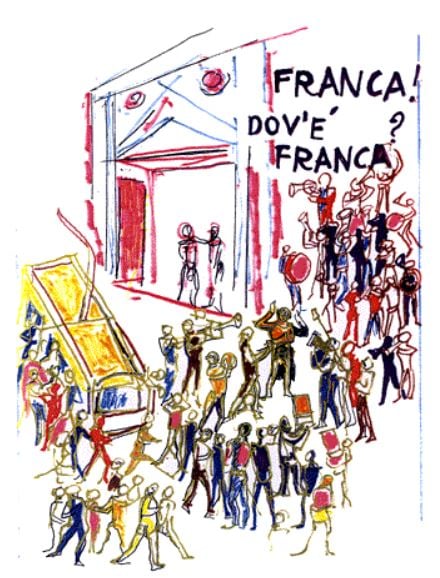
(At this very moment, Franca is on stage in a theatre in Italy but will join me the day after tomorrow. Her flight arrives midday, if you like we can all head out together to pick her up at the airport.)
Franca has a very sharp wit, I assure you. A journalist put the following question to her: “So how does it feel to be the wife of a Nobel Prize winner? To have a monument in your home?” To which she answered: “I’m not worried. Nor do I feel at all at a disadvantage; I’ve been in training for a long time. I do my exercises each morning: I go down on my hand and knees, and that way I’ve accustomed myself to becoming a pedestal to a monument. I’m pretty good at it.”
Like I said, she has a sharp wit. At times she even turns her irony against herself.
Without her at my side, where she has been for a lifetime, I would never have accomplished the work you have seen fit to honour. Together we’ve staged and recited thousands of performances, in theatres, occupied factories, at university sit-ins, even in deconsecrated churches, in prisons and city parks, in sunshine and pouring rain, always together. We’ve had to endure abuse, assaults by the police, insults from the right-thinking, and violence. And it is Franca who has had to suffer the most atrocious aggression. She has had to pay more dearly than any one of us, with her neck and limb in the balance, for the solidarity with the humble and the beaten that has been our premise.
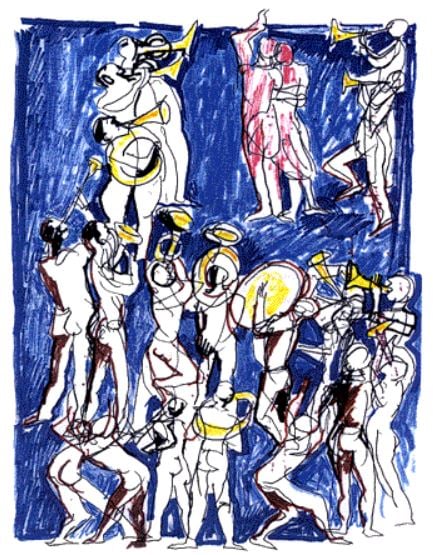
The day it was announced that I was to be awarded the Nobel Prize I found myself in front of the theatre on Via di Porta Romana in Milan where Franca, together with Giorgio Albertazzi, was performing The Devil with Tits. Suddenly I was surrounded by a throng of reporters, photographers and camera-wielding TV-crews. A passing tram stopped, unexpectedly, the driver stepped out to greet me, then all the passengers stepped out too, they applauded me, and everyone wanted to shake my hand and congratulate me … when at a certain point they all stopped in their tracks and, as with a single voice, shouted “Where’s Franca?”. They began to holler “Francaaa” until, after a little while, she appeared. Discombobulated and moved to tears, she came down to embrace me.
At that moment, as if out of nowhere, a band appeared, playing nothing but wind instruments and drums. It was made up of kids from all parts of the city and, as it happened, they were playing together for the first time. They struck up “Porta Romana bella, Porta Romana” in samba beat. I’ve never heard anything played so out of tune, but it was the most beautiful music Franca and I had ever heard.
Believe me, this prize belongs to both of us.
Thank you.
Translated from Italian by Paul Claesson
Nobel Prizes and laureates
Six prizes were awarded for achievements that have conferred the greatest benefit to humankind. The 14 laureates' work and discoveries range from quantum tunnelling to promoting democratic rights.
See them all presented here.
